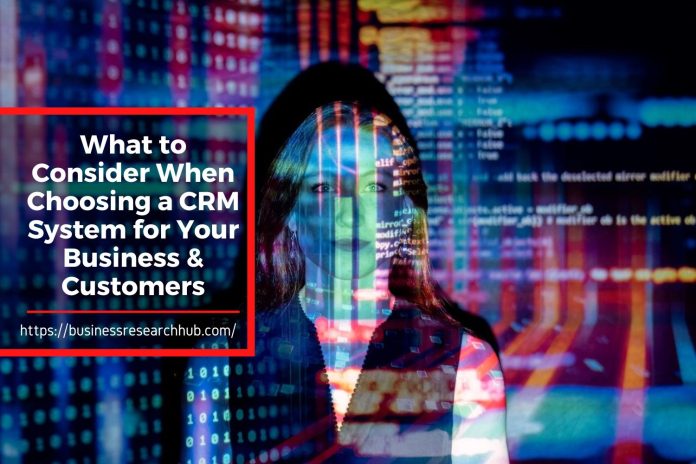While building a successful company, it might be difficult to decide on a single customer relationship management (CRM) system to meet your company’s needs.
How can you make the best choice for your company when so many are available?
There are a number of factors to think about when choosing the best CRM for your company.
However, it’s important to remember that not all customer relationship management systems are created equal. Therefore, you need to consider your company’s needs and see how well the features of certain CRMs fit your business model.
With that in mind, today, we are going to talk about how to choose the right CRM for your business.
1. Establish Why You’re Using CRM

The first thing you need to know before making a decision about the CRM you wish to use is why you need it in the first place. In what ways do you hope the new CRM will help you? Finding out what you want from a CRM is essential for making the most of the tool. However, almost every company will employ CRM to track key performance indicators (KPIs).
Therefore, before making any decision, make sure you first know what your KPIs are. The success or failure of your CRM deployment will largely hinge on how well you measure these KPIs. Once you and your team have established your objectives and key performance indicators, a customer relationship management system will help you keep track of your progress. The top metrics that most companies measure using CRMs are:
- Customer/Client Acquisition
- The success and efficiency of sales
- Marketing success
Take some time right now to explain these objectives and how a CRM might assist you in achieving them. In the long run, this will help to enhance ROI. This is the first of many questions you need to ask when choosing CRM. There are many others, and you need to ask all the questions if you wish to make the most informed decision.
2. Know What to Expect from Customer Relationship Management Software

Adding a customer relationship management system for your business is an essential step in modernization. And contrary to what the name implies, CRM provides more than simply contact management. It also has several features that you can use to increase revenue and improve marketing efforts.
For example, managing leads and making sales are separate but related processes. That being said, you can cultivate customers through the whole sales funnel with the help of CRM, from first contact to final purchase. As an added bonus, many customer relationship management systems let you keep tabs on invoices and sales quotations.
Notable Features of CRM Software
- Marketing. Email templates, email marketing funnels, SMS messaging, and lightweight project management tools are just some of the marketing features that CRM packages often included. Some of them can even keep tabs on the competition and provide sales projections.
- E-commerce. Some enterprise-level CRM programs come equipped with their own e-commerce features, while others make it simple to add such features by way of the application programming interface (API) or a third-party service.
- Reports/dashboards. The majority of customer relationship management systems provide reporting capabilities, with many premium packages also including interactive dashboards in real-time. Make sure the system you choose will allow you to import and export the data you require (for example, to and from Excel or QuickBooks).
- Inbound and outbound phone service. While the vast majority of CRM packages on the market lack dedicated contact center functionality, there are third-party interfaces that can join CRM and call center platforms. If a call center is essential to your operations, however, a CRM with such capabilities will be invaluable.
- Workflows/approvals. CRMs benefit greatly from integrated project management capabilities. High-quality customer relationship management systems often include features like workflows and approvals in the form of checkboxes to facilitate the administration and organizing of various tasks. However, the degree to which these project management solutions are adjustable differs from product to product, so if you need a certain workflow step or approval procedure, you should make sure it is doable with the program you pick.
3. Make Sure the CRM Is Scalable

If you want to choose the right CRM, make sure that it can support expansion and development since they are crucial to the health of your organization. Investing in a system that can adapt to your changing needs as your client base and company expand is essential since it will pay dividends in the long run. If you choose the right CRM from the start, you won’t have to worry about your sales process being disrupted when your company eventually outgrows its current system.
4. Make Sure It’s Compatible with Your Hardware
Many companies can’t afford to invest in a CRM that would need a complete overhaul of their IT department. This is why it’s essential to think about how much money you can afford to spend on a new system. Is mobile technology already heavily integrated into your business, and does your staff already own the hardware essential for a mobile CRM? The purchase of a customer relationship management system is just half the battle; the other half is figuring out how to tie that system into your existing company infrastructure.
5. It Needs to Be Affordable

And the last thing we’ll mention when discussing how to choose the right CRM for your business is affordability. Budgeting and cost considerations play a significant role in the success of any enterprise. Knowing the ins and outs of a CRM before making a substantial financial and time commitment is crucial.
One of the trickiest parts of looking for a customer relationship management system is striking a balance between price and features. Some customer relationship management systems may seem affordable and even offer a free trial, but it’s crucial to consider the ongoing expenses of maintaining and integrating the new system. It’s important to factor in the time and effort required to learn the new system as well as the expense of training your current employees to utilize it. It’s crucial that you know what features your new system will have.
Author Profile

- Online Media & PR Strategist
- I am an Online Media & PR strategist at ClickDo Ltd. & SeekaHost Ltd. and a Blogger and Educator by Passion. I am also a contributor to many News, Business, Education and Lifestyle Blogs in the United Kingdom. I have completed a journalism summer course at the London School of Journalism and manage various blogs.
Latest entries
 BusinessJune 26, 20246 Top Business Podcasts for Entrepreneurs and Startups
BusinessJune 26, 20246 Top Business Podcasts for Entrepreneurs and Startups BusinessMarch 26, 2024What Type of Business Insurance Do I need for my Business?
BusinessMarch 26, 2024What Type of Business Insurance Do I need for my Business? MarketingAugust 1, 2023How Interactive Content Can Help PPC Ads Generate More Qualified Leads
MarketingAugust 1, 2023How Interactive Content Can Help PPC Ads Generate More Qualified Leads BloggingJune 7, 2023The Benefits of Guest Blogging for Building Your Online Presence
BloggingJune 7, 2023The Benefits of Guest Blogging for Building Your Online Presence
